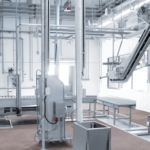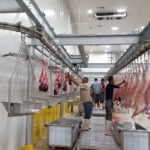
With advancements in automation, data management, and equipment, technology plays a pivotal role in enhancing efficiency, food safety, and animal welfare in abattoir design and processes.
This is an opinion piece or news article written by our staff.

Compliance with these regulations is essential to protect public health, maintain industry reputation, and adhere to legal requirements. In this article, we will explore the importance of ensuring regulatory compliance in abattoir design and processes and highlight the role of specialists in navigating this intricate landscape.
Abattoirs must have a comprehensive understanding of the regulatory requirements applicable to their operations. These regulations can cover various aspects, including animal welfare, food safety, sanitation, waste management, labeling, and worker safety. By staying informed about relevant laws and standards, abattoirs can proactively implement measures to ensure compliance from the initial design phase.
Hiring specialists in abattoir design plays a crucial role in ensuring regulatory compliance. These experts possess in-depth knowledge of industry standards and regulations and can assist in designing facilities that meet the specific requirements of regulatory bodies. Specialists can provide guidance on layout design, equipment selection, waste management systems, and other critical elements to align with regulatory expectations.
Abattoirs must obtain permits and certifications to demonstrate compliance with regulatory standards. This may include licenses from health departments, certifications for specific practices (such as organic or halal certification), and compliance with animal welfare regulations. Specialists can assist in navigating the application process, ensuring that all necessary permits and certifications are obtained before commencing operations.
Regular auditing and inspection are essential to assess and maintain compliance with regulatory requirements. Regulatory authorities may conduct inspections to evaluate the abattoir’s adherence to standards and identify any areas of non-compliance. Engaging specialists in regulatory compliance can help abattoirs prepare for inspections, ensure proper documentation, and implement corrective measures when necessary.
To ensure regulatory compliance, abattoir personnel must receive proper training and education. Specialists can facilitate training programs that cover topics such as food safety practices, animal welfare guidelines, proper handling and disposal of waste, and compliance with worker safety regulations. By investing in staff training, abattoirs promote a culture of compliance and enhance their ability to meet regulatory requirements consistently.
Regulations governing the meat industry can evolve over time, necessitating regular updates and adaptations within abattoirs. Engaging specialists who stay abreast of regulatory changes is essential in ensuring ongoing compliance. These experts can provide guidance on implementing necessary modifications, updating processes, and addressing any emerging regulatory concerns.
Accurate and up-to-date documentation is crucial for demonstrating compliance during regulatory inspections and audits. Abattoirs should maintain records pertaining to animal sourcing, processing methods, sanitation protocols, waste management practices, and employee training. Specialists can help establish comprehensive documentation systems, ensuring that all required records are properly maintained.
Adhering to regulatory requirements is a critical aspect of abattoir design and operation. By understanding and complying with relevant regulations, engaging specialists in abattoir design, applying for necessary permits and certifications, conducting regular auditing and inspections, providing training and education, keeping up with evolving regulations, and maintaining accurate documentation, abattoirs can ensure regulatory compliance. This commitment not only protects public health and fosters consumer trust but also contributes to the long-term sustainability and success of the abattoir in a highly regulated industry.

With advancements in automation, data management, and equipment, technology plays a pivotal role in enhancing efficiency, food safety, and animal welfare in abattoir design and processes.

Abattoirs play a critical role in this journey, serving as the gateway where livestock are transformed into meat products.

When it comes to abattoir operations, there are different models to consider, including small-scale and large-scale facilities.

Compliance with these regulations is essential to protect public health, maintain industry reputation, and adhere to legal requirements.